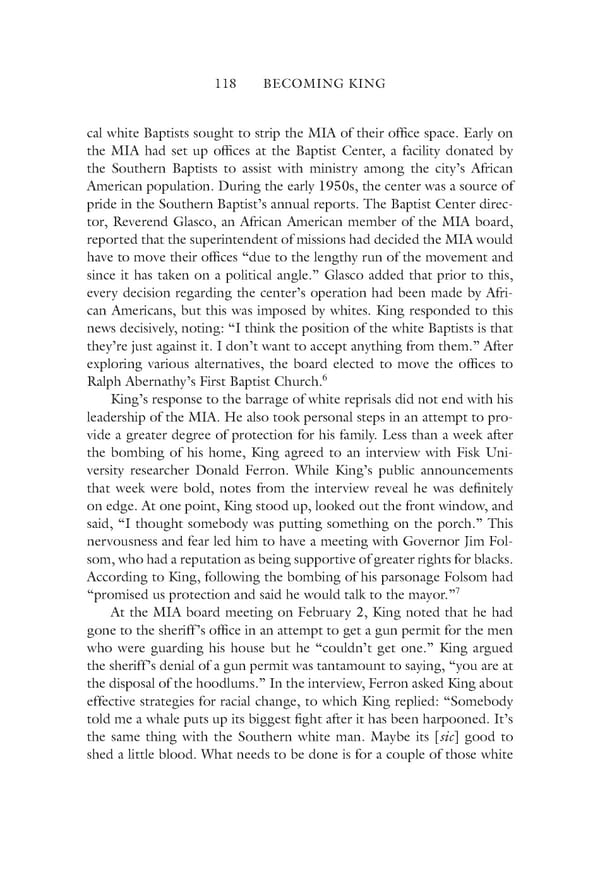118 BECOMING KING cal white Baptists sought to strip the MIA of their office space. Early on the MIA had set up offices at the Baptist Center, a facility donated by the Southern Baptists to assist with ministry among the city’s African American population. During the early 1950s, the center was a source of pride in the Southern Baptist’s annual reports. The Baptist Center direc- tor, Reverend Glasco, an African American member of the MIA board, reported that the superintendent of missions had decided the MIA would have to move their offices “due to the lengthy run of the movement and since it has taken on a political angle.” Glasco added that prior to this, every decision regarding the center’s operation had been made by Afri- can Americans, but this was imposed by whites. King responded to this news decisively, noting: “I think the position of the white Baptists is that they’re just against it. I don’t want to accept anything from them.” After exploring various alternatives, the board elected to move the offices to 6 Ralph Abernathy’s First Baptist Church. King’s response to the barrage of white reprisals did not end with his leadership of the MIA. He also took personal steps in an attempt to pro- vide a greater degree of protection for his family. Less than a week after the bombing of his home, King agreed to an interview with Fisk Uni- versity researcher Donald Ferron. While King’s public announcements that week were bold, notes from the interview reveal he was definitely on edge. At one point, King stood up, looked out the front window, and said, “I thought somebody was putting something on the porch.” This nervousness and fear led him to have a meeting with Governor Jim Fol- som, who had a reputation as being supportive of greater rights for blacks. According to King, following the bombing of his parsonage Folsom had 7 “promised us protection and said he would talk to the mayor.” At the MIA board meeting on February 2, King noted that he had gone to the sheriff’s office in an attempt to get a gun permit for the men who were guarding his house but he “couldn’t get one.” King argued the sheriff’s denial of a gun permit was tantamount to saying, “you are at the disposal of the hoodlums.” In the interview, Ferron asked King about effective strategies for racial change, to which King replied: “Somebody told me a whale puts up its biggest fight after it has been harpooned. It’s the same thing with the Southern white man. Maybe its [sic] good to shed a little blood. What needs to be done is for a couple of those white
 Becoming King: Martin Luther King Jr. Page 138 Page 140
Becoming King: Martin Luther King Jr. Page 138 Page 140